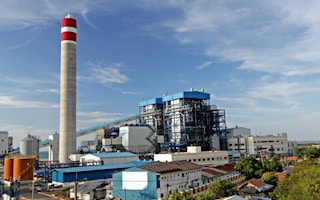Indonesia will go ahead with construction of what is set to be its largest coal-fired power plant in Batang, Central Java next year, a senior government official has said, downplaying opposition from environmental groups and the local community.
Developers have struggled to acquire the approximately 200 hectares of land needed for the planned PLTU Batang plant, which would have a 2000 megawatt (MW) capacity. Residents of five villages have protested the project, with some refusing to release their land on fears of potential environmental damage to the area.
Environmental groups also oppose the plant, saying it overlaps with a marine protected area and runs counter to President Susilo Bambang Yudhoyono’s commitment to reduce carbon emissions.
“We have concluded that the land problem is just a small issue, so the groundbreaking will go forward in 2014,” Economic Minister Hatta Rajasa said in Jakarta on May 17, as quoted by merdeka.com.
However local residents and a legal aid organization claim the land acquisition process has been marred by intimidation and human rights abuses, and that PT Bhimasena Power Indonesia (BPI), the company which will carry out the project, is still far from securing the needed land, despite government statements to the contrary.
“
The plant would release 10.8 million tons of carbon into the atmosphere, greater than the entire carbon emissions of Myanmar in 2009.
Greenpeace Indonesia
“Hundreds of thousands of residents from the five villages are still committed to oppose PLTU Batang. We maintain our ancestral land and we don’t want there to be environmental destruction in our area. And we reiterate that 70 per cent of our land still belongs to us,” Roidhi, a resident of Karanggenang, one of the villages affected by the project, told Mongabay-Indonesia.
Government officials have provided various conflicting figures on the amount of land needed for the project and the percentage that has already been acquired. Hatta has said the project will require a 192-hectare area, and that the company has already secured 187 hectares.
However Lucy Eko Wuryanto, deputy minister for coordinating infrastructure and regional planning, said the company had acquired 186 of the 226 hectares the project will require.
“When you look at the data mentioned by Hatta Rajasa…and Lucy Eko Wuryanto it is very clear that the data mentioned is a mere claim. Each person is reporting different data,” said Wahyu Nandang Herawan, a staff member of Lembaga Bantuan Hukum (LBH) Semarang, a legal aid organization that has been working with the community.
“This is a dirty strategy they are using to make it seem as if they have already acquired large amounts of land and expect that the residents who have not yet sold their land are hooked to sell.”
In a media release sent to Mongabay-Indonesia, LBH Semarang also claimed that residents of the area continued to face intimidation by thugs as well as by police and members of the military, who were urging residents to sell their land.
Greenpeace Indonesia has also spoken out against the plant. In a press release on April 3, the group said the plant would release 10.8 million tons of carbon into the atmosphere, greater than the entire carbon emissions of Myanmar in 2009.
The plant will also release 226 kg of mercury each year, the group said, and will overlap with the Ujungnegoro-Roban marine conservation area, polluting rich fishing waters and threatening the livelihoods of local fishermen.
“This attitude shows the reluctance of the government to stop the country’s addiction to coal, which is so high. Hatta Rajasa’s persistence to develop carbon-intensive power plants contradicts President SBY’s [Susilo Bambang Yudhoyono’s] commitment to reduce greenhouse gas emissions in Indonesia by 26 per cent in the year 2020,” Greenpeace Indonesia’s climate and energy campaigner, Arif Fiyanto, told Mongabay-Indonesia.
Once completed, PLTU Batang is expected to be one of the largest coal plants in Southeast Asia. BPI, a joint venture with Japan’s J-Power Electric Power Development Co. and Itochu Corporation and the Indonesian coal miner Adaro Energy, will build the $4 million plant.
Eco-Business published this story with permission from Mongabay. It was originally published as part of the Mongabay Reporting Network, licensed under Creative Commons.

















